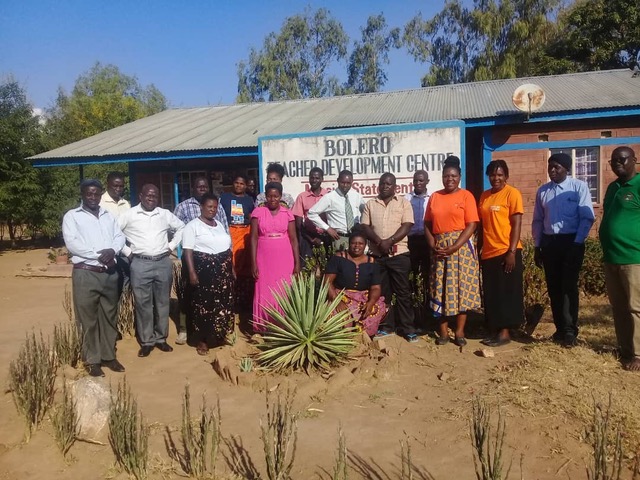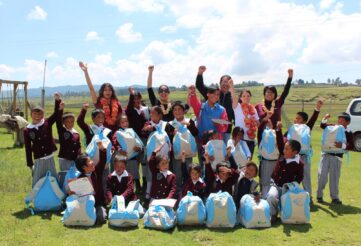Malawi Policy Win: When Communities Own Menstrual Health Solutions, Girls Benefit

In global health and development, NGOs often make the mistake of operating in a vacuum. We strive to have clear theories of change, well-researched interventions, and “SMART” objectives – but with too heavy a focus on organizational agendas, we run the risk of failing to honor the wisdom of those we serve. When this happens, program benefits tend to last only as long as our scheduled activities; we cause temporary change, but we do not contribute to transformative or sustained impact.
At Days for Girls, we are dismantling the “NGO vacuum,” centering community voices, and seeing marked results. Together with our stakeholders, we work towards clearly defined outcomes for menstrual equity (check out our theory of change to learn more). At the same time, how we go about achieving those outcomes is designed in response to local structures, cultures, and feedback. We aren’t perfect and we don’t have it all figured out, but as we learn together, we feel it is important to celebrate milestones and illuminate potential sticking points – in hopes that others will benefit from our journey.
Our national initiative in Malawi, launched in 2020, exemplifies a few learnings about what it takes to create menstrual health (MH) advances that can stand the test of time. DfG Malawi works across seven districts with communities that are rural, isolated, and experiencing extreme poverty. Women and girls lack reliable access to menstrual products; accurate and timely MH information; and positive social environments that support them to manage periods with health, safety, and dignity. They often experience forced isolation, social restrictions, and eating restrictions while menstruating, and menarche is viewed as a sign of marital readiness – all of which seriously hinder gender equality. In these communities, there are known gatekeepers, decision makers, and strong patriarchal structures. While these dynamics may seem unconducive for menstrual health programming, our DfG Malawi team saw an opportunity for transformation.

DfG Malawi staff and social entrepreneurs knew that in each district, there were political decision makers and social influencers who, if activated to champion menstrual health, could create a huge impact. For example, District Executive Committees (DECs) in Malawi oversee programs within their jurisdiction, while tribal leaders (called traditional authorities (TA’s)) have strong influence on social norms and attitudes. DfG Malawi facilitated education and behavior change conversations with these key stakeholder groups in all seven districts to garner buy-in and support for menstrual health programming in their areas.
Those who attended the meetings were humbled and shocked to learn about the challenges faced by women and girls, even in their own families, due to lack of supportive menstrual health environments. They adopted DfG Malawi’s call to support girls at home, at school, and in the community. Stakeholders in all seven districts organized MH Committees, who have the power to enact nationally recognized bylaws that apply to their jurisdictions. Five of seven Committees have already enacted legislation that protects girls from harmful practices such as forced isolation during menstruation. DfG Malawi continues to provide guidance and support to the Committees as we partner to support girls in their communities.
At the Days for Girls meeting, I was embarrassed that my area was one singled out as having high dropout and early marriage rates among pubescent girls. I decided in that meeting that I am going to do something about it immediately, so that next time my area will be an example of positive change taking place. As I speak, six girls came to me with their parents, to report that they voluntarily ended child marriages and the girls have been enrolled back in school.” – Traditional Authority Chilowamatambe, Kasungu
Within this policy win, there are four key components to our work that foster sustainability. These components may be replicable and scalable as an approach for working with other communities, and across multiple sectors:
- Community buy-in and ownership
DfG Malawi recognizes that communities exist with their own structures, social norms, attitudes, and practices. When communities own MH solutions and are activated to take up MH as their own cause, the activities and programs we create together can create lasting change for women and girls. - Local leadership
Supporting the leadership of DfG Malawi staff and social entrepreneurs is central to success. Their life experience, networks, and understanding of local culture and community inform the initiative, from defining priorities to progress evaluation. Their leadership ensures DfG Malawi programs are responsive to local needs and concerns. - Social enterprise model
DfG products are manufactured by locally owned and operated social enterprises. Enterprise activities sustain the business itself, and provide entrepreneurs with income generating skills and opportunities as DfG-certified sewists and educators. Our social entrepreneurs are viewed as trusted leaders in their communities. - Policy and advocacy
The most systemic and sustainable improvements for MH occur when supportive policies and programs are enacted, resourced, and implemented. DfG’s focus on advocacy and partnership with government institutions is helping to shift the needle on MH-related policy in Malawi. In addition to district level advocacy, we advocated nationally with the Women’s Parliamentary Caucus, the Malawi MH Hub, and Malawi Water, Environment, and Sanitation Network (WESNET) to secure removal of value-added tax (VAT) and excise duty on menstrual products nationally.
To date, the DfG Malawi initiative has reached over 5,000 women and girls in seven districts with DfG washable pad kits and menstrual health education – an impressive achievement. Through that program’s implementation structure, the DfG Malawi team has generated outcomes that will benefit thousands for generations: every woman and girl in these five communities are now protected, by law, from practices that previously limited them from participating in everyday life, pursuing opportunities, and achieving their dreams. In this way, local leadership can create impact at scale. We recognize that our work is far from over. But together with our stakeholders, we are committed to learning and working to address community needs.
Written by Haley Millet, DfG Strategic Partnerships Director









